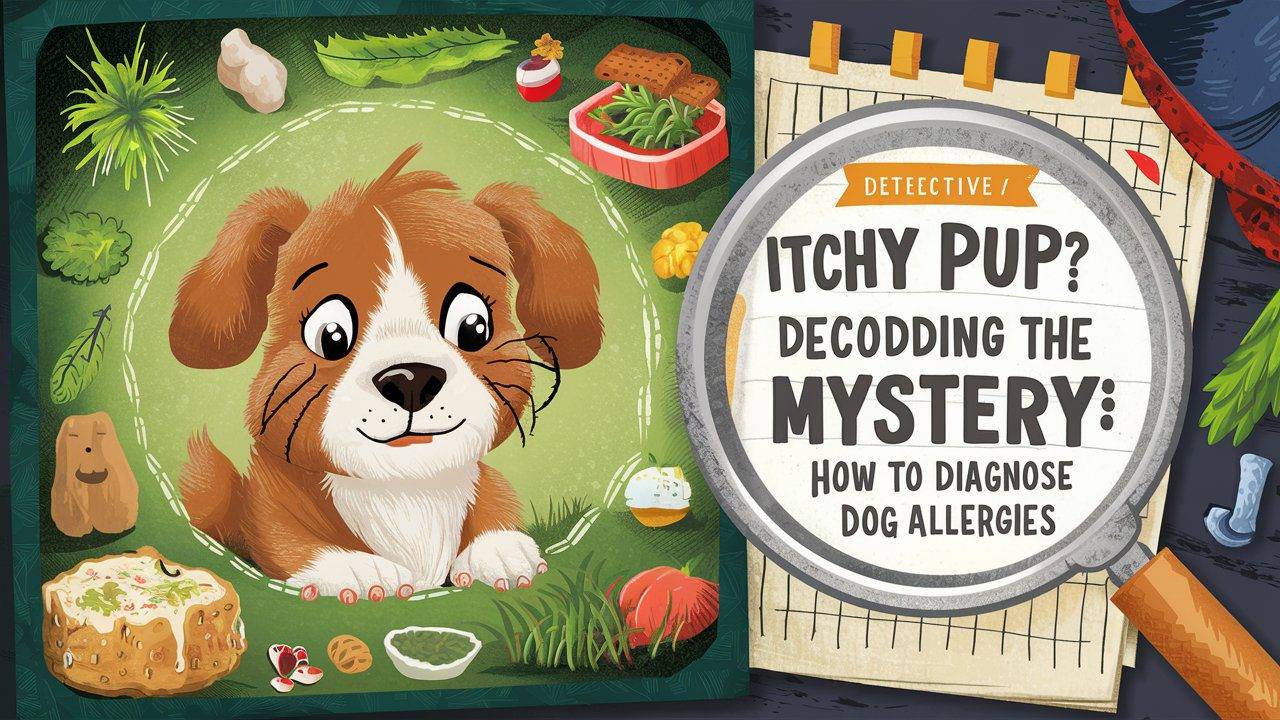Is your once sprightly pup constantly scratching himself raw? Has their playful spirit dimmed, replaced by a persistent itch that just won’t quit? You might be looking at a furry friend battling allergies. But don’t fret, pet detective! We’re here to crack the case and help you diagnose those pesky allergies.
Unlike us humans who can blurt out “Bless you!” after a sneeze or dramatically declare, “Peanuts? My throat is closing!” deciphering allergies in dogs requires a bit more sleuthing. Canine companions can’t exactly point the paw and say, “That darn pollen is making me miserable!” So, how do we uncover the culprit behind their itchy misery?
The Allergy Sleuth Kit: Signs and Symptoms
The first step is becoming a keen observer. Canine allergies can manifest in a multitude of ways, some more obvious than others. Here’s your allergy sleuth kit: a handy list of signs to watch out for:
- The Scratch Attack: This is a big one. Excessive scratching, licking, and chewing at paws, ears, or body are classic signs of allergies. Is your furniture suddenly sporting a new “anti-itch” sheen from your pup’s constant rubbing? Take note!
- Hot Spots and Hair Loss: All that scratching can lead to inflamed, irritated skin, or worse, hot spots – those red, raw, and painful patches. Hair loss around the itchy areas is another telltale sign.
- Skin Infections: Constant scratching can break the skin’s barrier, making it susceptible to bacterial or yeast infections. These can worsen the itch and discomfort for your furry friend.
- Ear Troubles: Red, inflamed ears, recurring ear infections, or constant head shaking could be signs of allergies, especially food allergies.
- The Sneeze Symphony: Does your dog have a sudden case of the sniffles or engage in epic sneezing fits? While it could be a common cold, allergies can also trigger these reactions.
- The Gurgling Gut: Vomiting, diarrhea, or excessive gas can sometimes be signs of food allergies in dogs.
Beware the Imposters! Ruling Out Other Culprits
Hold on a second, Sherlock Bones! Before you accuse every pollen particle or dust mite in sight, there are other potential culprits that could be causing your dog’s woes. Here are some imposters to consider:
- Fleas and Ticks: These pesky parasites can wreak havoc on your dog’s skin, causing intense itching. A thorough flea and tick check is essential to rule them out.
- Mange: Mites can also burrow into your dog’s skin, causing severe itching and hair loss. A vet visit will confirm if this is the case.
- Bacterial or Fungal Infections: Skin infections caused by bacteria or fungus can mimic allergy symptoms. Your vet can diagnose the specific culprit and prescribe the appropriate treatment.
- Yeast Infections: Warm, moist areas like your dog’s ears can harbor yeast overgrowth, leading to redness, itchiness, and a bad odor.
Calling in the Reinforcements: Veterinary Diagnosis
If you’ve meticulously observed your dog’s symptoms and ruled out other possibilities, it’s time to call in the reinforcements – your veterinarian! They’re your partner in crime-solving this canine allergy mystery.
Here’s what to expect at the vet’s office:
- The Interrogation: The vet will become your very own Columbo, asking detailed questions about your dog’s symptoms, their diet, lifestyle, and environment. Be prepared to spill the kibble – every detail helps!
- The Physical Examination: A thorough physical exam will allow the vet to assess your dog’s overall health and pinpoint any signs of skin irritation, infections, or other abnormalities.
- The Elimination Diet (Food Allergies): If food allergies are suspected, the vet might recommend an elimination diet. This involves feeding your dog a special food with limited ingredients for a specific period. Based on their reaction, the vet can narrow down the potential food allergens.
- Allergy Testing: There are various allergy tests available, including skin tests and blood tests. These can help identify specific allergens your dog might be reacting to, like pollen, dust mites, or mold.
Unmasking the Villain and Charting the Course to Relief
Once the culprit is identified, your vet can create a personalized treatment plan to combat those pesky allergies. This might involve:
- Dietary Changes (Food Allergies): If food allergies are the culprit, a change in diet to a hypoallergenic food that excludes the identified allergens will be recommended.
Medications: Antihistamines or corticosteroids can help manage allergy symptoms like itching and inflammation. In some cases, medicated shampoos or wipes might be prescribed to soothe irritated skin.- Immunotherapy: For long-term management, especially for environmental allergies, immunotherapy might be an option. This involves gradually introducing small amounts of the allergen to your dog in a controlled setting, essentially retraining their immune system not to overreact.
- Environmental Management: If your dog suffers from environmental allergies, like pollen or dust mites, minimizing their exposure can significantly improve their comfort. Regular cleaning, using air purifiers, and limiting outdoor playtime during high-pollen seasons are some helpful strategies.
Remember: Patience is key! Treating allergies can be a marathon, not a sprint. It might take some time to find the right combination of treatments and for your dog’s symptoms to subside completely. But with perseverance and the help of your vet, you can unlock a world of itch-free relief for your furry friend.
Bonus Tip: The Pawsitive Power of Probiotics!
While not a cure-all, probiotics can be a helpful addition to your dog’s allergy management plan. These beneficial bacteria can support a healthy gut microbiome, which can play a role in overall immune function and potentially reduce allergic reactions. Talk to your vet about whether probiotics might be a good fit for your dog.
Living with Allergies: Keeping Your Pup Happy and Healthy
Even with allergies, your dog can still live a happy and fulfilling life! Here are some tips for keeping your allergic pup comfortable:
- Regular Brushing and Bathing: Regular grooming helps remove allergens trapped in your dog’s fur and soothes irritated skin. Use a gentle shampoo recommended by your vet.
- Soothing Relief: Provide itch relief with hypoallergenic sprays, oatmeal baths, or a cool compress on affected areas (with vet approval).
- Focus on Enrichment: Allergies can sometimes lead to boredom and frustration. Provide plenty of mental and physical stimulation through playtime, training sessions, and interactive toys to keep your pup happy and occupied.
By becoming a keen observer, partnering with your vet, and implementing a personalized treatment plan, you can transform your dog’s life from an itchy nightmare to an itch-free dream. Remember, a little detective work and a whole lot of love go a long way in helping your furry friend thrive, allergies and all!



